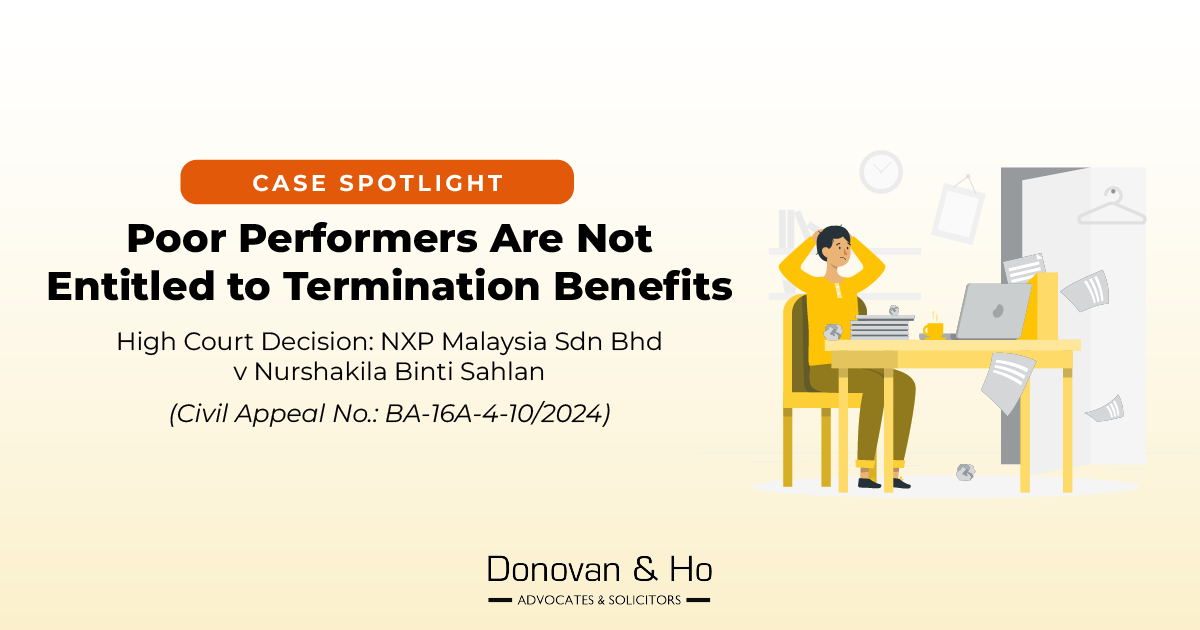Sleeping at work is a misconduct, but it may not always be the case that it warrants dismissal. A dismissal may be considered disproportionate if:
- the misconduct is not serious enough to fundamentally breach the employment contract, as opposed to more grave misconduct concerning theft, fraud and violence;
- the employee is a first-time offender with no prior warnings for similar behaviour; and
- there are significant mitigating factors, such as good work performance, achievement of targets and medical conditions that may have contributed to the sleeping incidents, as in this case, sleep apnea.
In Mohd Fauzi Mohd Shariff V. Bank Islam Malaysia Berhad, Award No. 25 Of 2025 [Case No: 18-4-1600-22], the Industrial Court had to consider whether an employee deserved to be dismissed after being caught sleeping on the job.
Brief Facts
The Claimant was a Branch Manager of one of Bank Islam’s branches.
He was accused of sleeping at the workplace, on 11 occasions between October 2020 and April 2021. Photographs exhibited by the bank showed him asleep in his office, sometimes immediately after morning briefings and at times during lunch hours.
The Claimant denied misconduct, arguing that he suffered from sleep apnea, a medical condition causing involuntary “micro-sleep.” He further claimed that the naps were brief and did not disrupt operations, pointing out that the branch consistently met its business targets.
A domestic inquiry found him guilty, and he was dismissed from employment in respect of a charge of misconduct for sleeping in the workplace. He brought a claim under Section 20(3) of the Industrial Relations Act 1967 for dismissal without just cause or excuse.
Industrial Court’s Findings
The Court held that the Claimant had undoubtedly been asleep at his workplace, and that this amounted to misconduct under the bank’s disciplinary code. However, it considered dismissal to be a disproportionate response.
In applying the doctrine of proportionality, the Court observed that termination is usually justified only in cases of serious misconduct such as theft, fraud or violence, which undermine the foundation of the employment relationship.
The Court also considered several mitigating factors. The Claimant was a first offender with no prior disciplinary record. He suffered from a diagnosed medical condition, namely severe obstructive sleep apnea, and the branch continued to meet its sales targets despite the incidents.
The bank’s own HR policy allowed for lesser sanctions such as demotion, the stoppage or deferment of increments or the issuance of a warning. Dismissal was, in the Court’s view, unnecessarily harsh and amounted to the “capital punishment” of industrial law.
Reinstatement was not deemed appropriate, as the Claimant was close to retirement and his position had already been filled. The Court instead awarded backwages and compensation in lieu of reinstatement.
That being said, the Court found that there was contributory misconduct by the Claimant. Given his managerial position, the Claimant ought to have sought treatment at an earlier stage and exercised greater professionalism. Taking this into account, the total award was therefore reduced by 50%.
Key Takeaways
The Court recognised that sleeping at work constitutes misconduct. However, whether dismissal is justified depends on the surrounding circumstances and the principle of proportionality. Termination is not an automatic consequence of misconduct. Employers are expected to consider whether lesser disciplinary measures are appropriate where mitigating factors exist.
In this case, the Court placed significant weight on the surrounding circumstances, including the Claimant’s medical condition and severe sleep apnea, his explanation of the incidents, and the continued satisfactory performance of the branch under his management.
This decision should not be misconstrued as a blanket endorsement for employees to sleep at work without serious consequences. Each case must be assessed in its own context. Here, the Court found dismissal to be disproportionate but nevertheless applied the principle of contributory misconduct. The Claimant, as a senior employee, was expected to exercise greater responsibility and professionalism. His failure to address his medical condition earlier was a key factor in the Court’s decision to substantially reduce the compensation awarded.
***
This article was written by Nalina Santhiran (Associate) from Donovan & Ho’s employment law & dispute resolution practice.
Donovan & Ho is a law firm in Malaysia, and our employment practice group has built a reputation for providing strategic employment advice to local and global organisations. Our team of employment lawyers provide advice on employment law and industrial relations including review of employment contracts, policies and handbooks, advising on workforce reductions, and managing dismissals of employees for poor performance or misconduct. We also represent clients in unfair dismissal claims and employment-related litigation.
Have a question? Please contact us.






